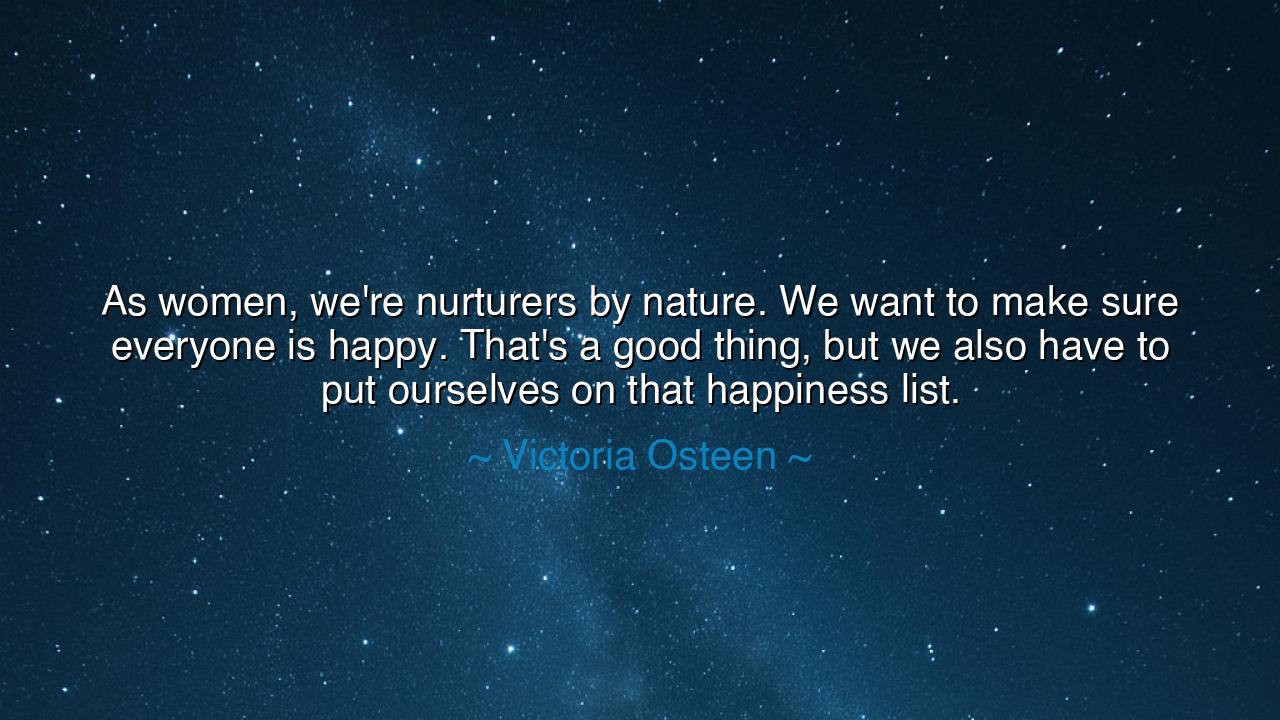
As women, we're nurturers by nature. We want to make sure
As women, we're nurturers by nature. We want to make sure everyone is happy. That's a good thing, but we also have to put ourselves on that happiness list.






When Victoria Osteen spoke the words, “As women, we’re nurturers by nature. We want to make sure everyone is happy. That’s a good thing, but we also have to put ourselves on that happiness list,” she uttered a truth that has echoed through the ages—a truth born of love, sacrifice, and the sacred duty of care. Her words are a gentle but powerful reminder that compassion must begin within, and that even the kindest heart must not forget to beat for itself. In these lines lies not only wisdom for women, but for all who give endlessly to others while neglecting their own light. For what use is a flame that warms the world, if it burns itself to ash?
From the dawn of civilization, women have been the keepers of life’s tenderness—the ones who mend, who nourish, who comfort. In every home, from the grand palaces of empires to the humblest cottages, it has been the woman’s hands that have soothed the fevered, fed the hungry, and stitched together both garments and hearts. Yet in this divine role of nurturer, many have forgotten that their own souls too must be fed. Osteen’s words remind us that to give endlessly without replenishing one’s own spirit is not holiness, but exhaustion dressed in virtue. True love does not demand the death of the self—it demands balance, the sacred harmony between service and self-care.
In the old tales, even the goddesses understood this truth. Demeter, the Greek goddess of the harvest, was known for her boundless care of the earth’s fertility. But when her daughter Persephone was taken into the underworld, Demeter’s grief turned the earth barren. Only when she allowed herself to rest and to accept the rhythms of life did the fields bloom again. Thus, from ancient myth we learn that the world cannot thrive if the nurturer’s heart grows weary. The earth itself withers when love is poured out without renewal. So too must every woman, every giver, remember that her own joy is not selfish—it is the soil from which all her gifts grow.
The nurturer’s spirit is a sacred power, but it must not become a chain. There is beauty in sacrifice, but also danger in self-erasure. Many women—mothers, daughters, healers—have been taught to measure their worth by how much they give, how much they endure, how much of themselves they pour out for others. Yet Osteen’s words rise like a call to awakening: to place oneself on the happiness list is not vanity, but wisdom. A woman who honors her own needs becomes a stronger pillar for those she loves. Her joy becomes a light by which others find their way.
Consider the life of Florence Nightingale, the Lady with the Lamp. She walked through the darkness of war tending to the wounded, her compassion unending. Yet even she, whose love seemed infinite, fell ill from overwork and grief. Only when she withdrew from the battlefield to recover did her deeper contribution begin—founding the modern nursing profession, shaping systems of care that would last generations. Her story reveals what Osteen teaches: to sustain the act of giving, one must learn the art of renewal. Rest is not weakness; it is the seed of endurance.
And yet, this lesson is not easily lived. To put oneself on the happiness list requires courage—the courage to believe that your joy matters, that your laughter is not less holy than your labor. It means saying “no” when the world expects endless “yes,” and trusting that love need not destroy the self to be true. It means finding moments, however small, to nurture your own spirit: to walk in the sun, to breathe deeply, to create, to dream. In doing so, you do not abandon others; you empower yourself to serve them with greater strength and peace.
So let this be the teaching carried forth: self-love is not selfishness—it is sacred stewardship. The well that never refills will soon run dry, and the heart that never rests will one day break under its own compassion. Therefore, to all who listen—women and men alike—remember this: take time to feed your own soul. Put your name upon your list of care. Tend your joy as carefully as you tend the joys of others. For the world needs not only your kindness, but your wholeness. And when you honor your own happiness, you give the greatest gift of all—a love that endures, radiant and alive, through every season of life.






AAdministratorAdministrator
Welcome, honored guests. Please leave a comment, we will respond soon